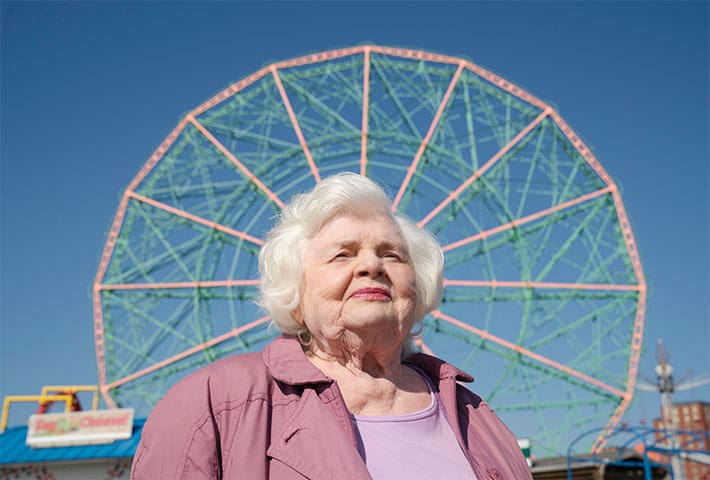
Pop Break is celebrating its 16 year anniversary by raising money for St. Jude!
If you have a few dollars, please consider giving to help children and their families out! Click here to donate.
Out of all historical events, it seems like World War II dominates the media — especially stories about the Holocaust. But it’s rare to see a film that looks at Holocaust survivors in the present day, grappling with trauma and grief. Scarlett Johansson’s directorial debut, Eleanor the Great, does exactly this — although with one main caveat.
When we meet 94-year-old Eleanor (June Squibb), she’s living in Florida with her best friend of 70 years, Bessie (Rita Zohar). The two do everything together, from velcroing their orthopedic shoes and stretching on the beach to grocery shopping at the same store every Friday for 16 years. It’s during one of these shopping trips that we’re first introduced to Eleanor’s feistiness. It’s a scene that leaves you unsure if you should root for her or not. She’s funny and knows what she wants, but she’s also perhaps a little too mean to the young man working at the Shady Oaks grocery store.
We quickly learn Eleanor is a habitual liar, though never about anything too important. She convinces a nurse that a hospital wing is named after Bessie’s family (“What, Stern is a common last name.”) and even agrees that “Hitler took my smile,” though we later learn she grew up in the Bronx. In these moments, it becomes clear she’s identifying with Bessie’s past of living in Nazi-occupied Poland, a fact revealed in a brilliantly subtle touch by Johansson and cinematographer Hélène Louvart: a fleeting glimpse of Bessie’s tattoo as she points the Shady Oaks clerk toward the pickles.
When Bessie dies suddenly, Eleanor moves in with her daughter Lisa (Jessica Hecht) in New York. Encouraging her to make friends, Lisa signs her up for the Broadway Singing Squad at the local Jewish community center, but instead, Eleanor stumbles into a Holocaust survivor’s support group. After realizing her mistake, she tries to leave, but ultimately gives in, and perhaps out of sheer awkwardness, she shares Bessie’s stories of survival as her own, drawing the attention of Nina (Erin Kellyman), an NYU student searching for a subject for her journalism class.
While the story follows a fairly predictable path, it’s not the simplicity of the plot that the film relies on. Instead, it uses this straightforward storyline to delve deeply into the characters. Kellyman delivers a moving performance as Nina, capturing the ache of losing her mother too young, while June Squibb commands every scene as the feisty, sharp-witted Eleanor. Bessie’s stories and Eleanor’s lies could have easily overshadowed the character of Eleanor, but the script gives enough time for us to see her outside of those layers, revealing her true self. Together, Squibb and Kellyman share remarkable chemistry, believably portraying best friends who shop, get pedicures, and even talk about sex over pizza despite their 70-year age gap.
One of Eleanor the Great’s biggest achievements is its ability to blend humor and heaviness without ever feeling disrespectful. There’s a particularly wonderful scene when Nina takes Eleanor on a surprise day trip; in the back of a cab, Eleanor wears a satin eye mask with one embroidered eye open as they discuss the death of Nina’s mom. Johansson and writer Tory Kamen often balance humor and sadness within the same beat. This film could have easily felt insensitive or disjointed, but it masterfully manages this emotional range.
The Holocaust survivors’ group is played by real survivors, adding an invaluable layer of authenticity. And while Eleanor’s deception could have sunk the film in discomfort, Eleanor the Great instead becomes a thoughtful meditation on grief, memory and connection.
As a debut director, Johansson proves surprisingly adept at balancing humor and sorrow, creating a story that feels both intimate and universal. Eleanor the Great is a lighthearted yet moving tribute to Holocaust survivors and to anyone who’s ever felt alone in the midst of loss.

